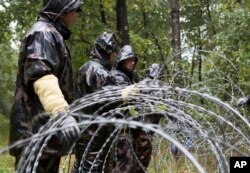Opinions of young Europeans appear to be hardening toward immigration. Ask them about their lives and talk quickly turns to the challenge of finding jobs and the threat of Europe being overrun by migrants.
In Hungary, Kitti, a 28-year-old sports teacher and mother of an eight-year-old girl, says, “I went to the main railway station in the summer to help migrants." But since then her heart has hardened.
“I think we need to stop them coming, they think differently from us, especially when it comes to women.”
She cites the notorious drunken gang assaults on women in Germany’s Cologne and Hamburg during the New Year festivities. She describes herself as a progressive in politics, but backs Hungary’s controversial prime minister, Viktor Orbán, in his demand that Europe staunch the flow of refugees and migrants.
To the north of Hungary, anti-migrant protesters in Poland took to the streets Sunday to echo Kitti’s fears. The protesters at Gora Kalwaria, 30 kilometers south of Warsaw, said they feared for women and children after the New Year’s Eve sex attacks in Germany.
Others complained migrants would not be able to integrate because of different traditions.
A radical proposal to put a fence around Greece, cutting it off from the rest of the European Union to curb the flood of migrants, is gaining traction among the continent’s political elites and will be at the forefront of what are likely to be contentious talks Monday between European interior ministers in Amsterdam.
First voiced by Orbán months ago, to widespread disapproval by other EU leaders, the proposal would exclude Greece from the border-free Schengen zone, temporarily isolating the main European transit country for war refugees from the Middle East and mainly economic migrants from sub-Saharan Africa.
Ring-fencing proposal
After months of failed bids to curb the flow into Europe, more than a million refugees and migrants from countries such as Syria, Iraq and Afghanistan arrived in Europe last year, domestic political pressure is growing to find a solution. Greek leaders say the proposal would turn their country into a refugee “black box.”
But German officials say Chancellor Angela Merkel, the architect last summer of a “welcome culture” for refugees, is now prepared to back the ring-fencing proposal. German officials say some order has to be brought to the chaos of the biggest movement of people to impact Europe since the Second World War.
“It may deter Syrian refugees from setting off from Turkey in the first place,” a German official told VOA. Merkel has come under unprecedented criticism from political allies for her refusal to cap the number of asylum-seekers Germany will admit.
The readiness of Berlin to endorse the ring-fencing idea is testimony to the scale of the crisis.
The plan envisages Macedonia, a non-EU country, receiving policemen, technical equipment and money from EU countries to help close its border with Greece, was formally proposed last week by Slovenia’s Miroslav Cerar in a letter to EU counterparts. The guiding tactical hand behind it, though, is Orbán’s say EU officials.
Orbán says only a fence erected on the Macedonian and Bulgarian borders with Greece to stop the inflow of migrants into Europe would have a chance of saving visa-free travel within the EU.
“If we cannot secure the outer border [of the EU], regardless of how costly or demanding that is, we will destroy the Schengen regime by ourselves," Orbán said.
The Schengen zone is made up of 26 European countries that allow visa-free travel across their joint borders. Until the migrant crisis this summer there were no passport or immigration checks on any of the joint borders, but since the summer a handful of Central European and Nordic countries have erected fences and imposed passport checks, at least on borders that asylum-seekers are crossing.
Hardline anti-migrant stance
Hungary led the way in July, erecting a 175 kilometer steel and razor-wire fence along its wooded border with Serbia after more than 80,000 migrants crossed into the country.
The fence drew the ire of migrant rights groups, the U.N. refugee agency and the European Commission, but Orbán has linked unmanaged immigration to jihadist terrorism and insists border security is a national obligation. His stand is popular in his home country, polls show about two-thirds of Hungarians see immigration as a national security threat.
Orbán’s hardline anti-migrant stance has earned his governing Fidesz party a rising share of support in opinion polls, at the expense of the more right wing Jobbik party.
And with like-minded leaders in Poland, where the Law and Justice party swept to electoral victory in November, Slovakia and Slovenia, which have announced new moves to bar migrants apart from those planning to move on to Austria and Germany, the Hungarian leader appears to be shaping a bloc within the EU that appears likely to wield increasing clout.






